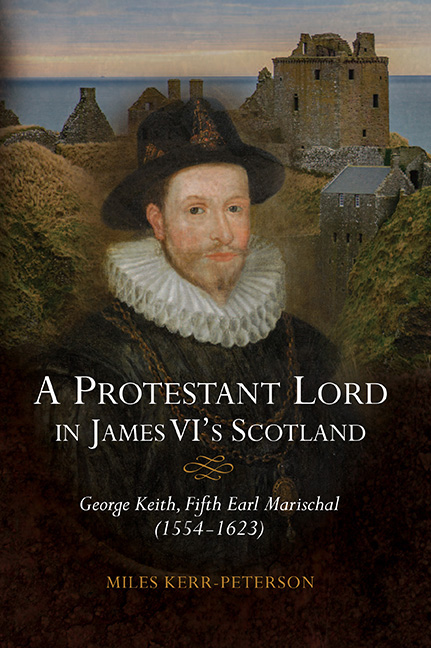Book contents
- Frontmatter
- Contents
- List of Illustrations
- Acknowledgements
- Conventions
- Abbreviations
- Map
- Introduction
- 1 Inheritance and Education, 1513–1582
- 2 Three Feuds and Jacobean Politics, 1582–1595
- 3 Service to the State, 1595–1623
- 4 Defending the Borders of the Earldom, 1595–1623
- 5 Family Strategies and Crises, 1595–1623
- 6 Lordship and the Reformed Kirk, 1560–1623
- 7 Economic Activities, 1581–1623
- 8 Marischal College, 1593–1623
- Conclusion
- Appendices: Genealogies
- Bibliography
- Index
- St Andrew Studies in Scottish History
- Frontmatter
- Contents
- List of Illustrations
- Acknowledgements
- Conventions
- Abbreviations
- Map
- Introduction
- 1 Inheritance and Education, 1513–1582
- 2 Three Feuds and Jacobean Politics, 1582–1595
- 3 Service to the State, 1595–1623
- 4 Defending the Borders of the Earldom, 1595–1623
- 5 Family Strategies and Crises, 1595–1623
- 6 Lordship and the Reformed Kirk, 1560–1623
- 7 Economic Activities, 1581–1623
- 8 Marischal College, 1593–1623
- Conclusion
- Appendices: Genealogies
- Bibliography
- Index
- St Andrew Studies in Scottish History
Summary
In William Ogston's funeral oration for the earl there is a detailed, if idealised, description of the earl's death. We are told that Marischal felt himself to be dying, and took himself to his chamber and bed in Dunnottar Castle, where his ancestors had all also died. He summoned ‘physicians of the body and soul’, including Patrick Dun, the principal of Marischal College and physician. Either sitting up or lying down, he recited various articles of faith. He died at five in the morning on 9 April 1623. On Wednesday 25 June 1623 his body was processed from Dunnottar Castle to the parish church, in a similar fashion to that recorded in the template ‘Huntly Funeral Roll’, and his body was taken into the family vault to join his ancestors. A separate service was held in Marischal College on 30 June, where Ogston gave his oration. King James later recalled the deceased Marischal and ‘the memorie of that man, who had to our honour and contentment served us at home and abroade in greatest charges’.
This book has closely examined the career of George Keith, fifth Earl Marischal, through the reign of James VI from political, religious and regional perspectives. Its findings and their implications do not overturn our overall understanding of the Scottish nobility, as broadly delineated in the works of Jenny Wormald and Keith Brown, but add greater definition and detail to the picture. Marischal stands as a counter-example of long-term, stable, moderate, Protestant lordship against the more roguish figures explored in depth to date, in the form of the notorious and rebellious earls of Huntly, Bothwell and Orkney.
Marischal's highly active political career from 1580 to 1595, explored in chapter two, saw the earl navigate various difficult political landscapes in three phases. Emerging from the storm surrounding the Lennox, Ruthven and Arran regimes at the start of James’ personal rule, the first phase saw Marischal pitted against the might of the earl of Huntly. Although Marischal could not hope to match his rival for sheer force or political influence, the Keiths managed to resist the Gordons, as Marischal had just enough command in the localities, and just enough influence at court, to defend his interests.
- Type
- Chapter
- Information
- A Protestant Lord in James VI's ScotlandGeorge Keith, Fifth Earl Marischal (1554–1623), pp. 189 - 194Publisher: Boydell & BrewerPrint publication year: 2019

